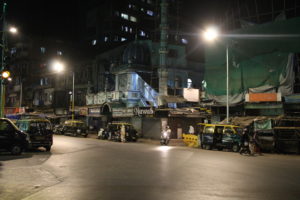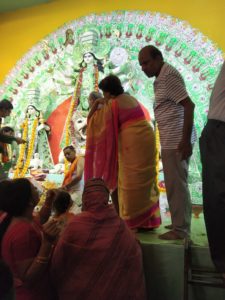Coronavirus pandemic subdues festive spirits in India

During Ramadan, all the nooks and corners of Mohammad Ali Road offer resplendant sights of hundreds of people trying out various delicacies. But this year due to the lockdown the entire area is deserted. (MIG Photos/Varsha Singh)
Noise, large crowds and gaiety are the traditional hallmarks of any Indian festival. However, thanks to the coronavirus pandemic and the lockdown, Indians are discovering another way of marking festivals – indoors and in silence.
The landmark Mohammad Ali Road in south Mumbai offers a resplendent sight during the entire holy month of Ramadan. The Muslim-dominated locality comes alive with the sundown as thousands of devout Muslims, not just from the area but indeed entire Mumbai, gather to break their fast and feast on the numerous specialities that restaurants and street food vendors have lined up for them. Right through the night and up to sunrise, when the fasting begins again, could put the busiest of beehives to shame.
But this year, Mohammad Ali Road appears entirely deserted during the Ramadan thanks to the lockdown that has been imposed all over the country following the outbreak of coronavirus pandemic. In the night, the streets here are as dark and lonely as a small lane in a village that goes to sleep at sundown.
But the residents and other Muslims are not too upset about spending the most important festival locked indoors. “It is unfortunate and definitely for the first time that we are seeing a Ramadan where one cannot even go to the mosque, but that is alright. I pray at home and here at my shop. Then I go home, break the fast with my family and stay indoors,’’ says Niyamat Shaikh, who runs a small computer repair shop at Chembur in north-eastern Mumbai. Indeed, Muslim spiritual leaders have already said very clearly that the devouts should follow the lockdown and stay indoors and do not need to go to the mosques to pray even for Eid.
“Eid, by no means will be the same this year. Neither will there be a huge crowd at Red Road in Kolkata, where a congregation used to come together for Eid prayers. We are afraid to make any sort of get-together plans. However, what will remain the same is the taste of the Sheer Qorma, the warmth of the wishes, the sincerity of our prayers and the happiness of completing yet another month of fasting,” says Tunjeena Ahmed, an event manager from Kolkata.
Not just the Muslims but the pandemic has affected festivals of all religions. Even before the lockdown came, it was a totally colourless Holi, the festival of colours that is celebrated by millions all over India. Normally, hundreds gather for Holi in each locality, but this year, people stayed indoors and avoided large gatherings.
The first major festival to be affected by the lockdown was Easter in early April. “This was the first time I have celebrated Easter at my house and I hope this was the last,” says Daniel D’Souza, a television professional from Mumbai. The D’Souzas, like millions of other Christians in India, usually celebrate Easter and other Christian festivals with a mass in their local church and by meeting relatives and family. However, thanks to the coronavirus pandemic and the ensuing lockdown, Easter this year was subdued, entirely indoors and just for the immediate family members. “Thank goodness, the internet was working, so at least we could see the live stream of the mass from the Holy See on YouTube,’’ adds D’Souza.
With little certainty on the future of the pandemic, there is a cloud on the fate of upcoming festivals like Ganesh Chaturthi, celebrated in a major way in western India, notably in Maharashtra, that normally comes around September or the Durga Puja, the carnival of West Bengal, a festival that lasts 10 days, but is awaited for the rest 355 by each Bengali.
“Celebrations will be low-key this year as many will avoid mass gathering. Durga Puja will be more of a private affair. Even if the lockdown gets lifted we know life is not going to go back to the way it was earlier, at least for a year. Going out for pandal hopping this year isn’t an option. Durga Puja will be celebrated I am sure but at a much smaller scale,” says Toshi Karan, a teacher from Kolkata.
“Usually I don’t celebrate Ganesh festival but just love seeing the drums play and dancing in the procession. But this year I feel all these things will change a bit for me at least, as I will restrain myself from enjoying it in the same way as I used to,” says Vishal Ahire, a volunteer working for an NGO in Ahmednagar, Maharashtra.
Even if the festivals are impacted during the pandemic, it is highly unlikely that Indians would continue to celebrate their favourite festivals indoors and in silence, once the threat of coronavirus pandemic has passed.










